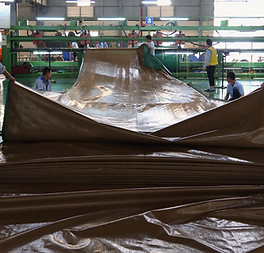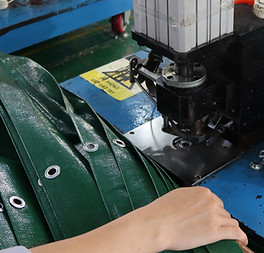
MANUFACTURING PROCESS
We understand the importance of durability and performance, which is why we closely monitor every step of the production. Our commitment to quality is reflected in our use of facilities and on-site management by skilled technicians.
01. EXTRUDING
%20(1)_edited_edited.png)
The extruding process is the first step in the production of tarps. It involves melting the raw material of HDPE to create a film, which is then slit into tape yarns. Our extruding line controls the denier of yarns to ensure that they are precisely tailored to your specific requirements.
Number of machines
Yarn range
Remark
7 ea
550 D/A to 3000 D/A
T-Dies type
02. WEAVING
Using a water jet loom, the yarns are woven together with utmost precision, resulting in a roll of sheet primed for coating.
Number of machines
Mesh range
Maximum width
Remark
126 ea
6 x 6 to 16 x 16
2.20 m
Water-jet

03. COATING

HDPE sheets are coated with LDPE resins and masterbatch, which is a coloring material, to create a waterproof tarp. During the process, additives such as UV and FR are added to enhance the tarp's durability.
Number of machines
GSM range
Maximum width
Remark
2 ea
45 gsm to 350 gsm
2.12m
Duplex type
04. FABRICATING
The coated fabric is carefully cut and welded during the fabrication process to ensure a precise fit. We insert PP rope in the hem for reinforcement and punch eyelets for easy installation.
Number of machines
Fabric size
Remark
4 ea
Any size
Surface heating type


CUTTING

SIDE WELDING

PUNCHING EYELETS
05. CONVERTING

Rewinding is a crucial final step in the production process of roll products. Coated jumbo rolls are rewound into smaller rolls, ensuring that they are ready for use in variety of applications.
Number of machines
Remark
2 ea
Digital length measurement
06. PACKING AND LOADING
We ensure that your finished products are packed to your exact specifications, guaranteeing that they are well-protected and ready for shipment.





